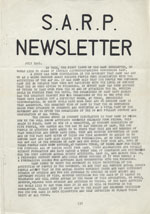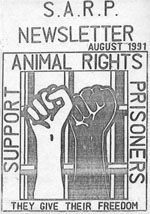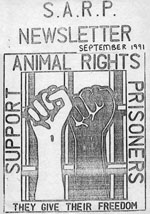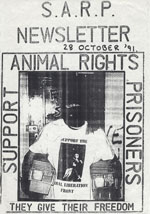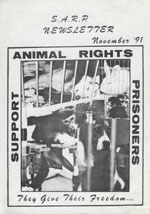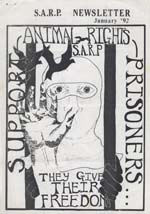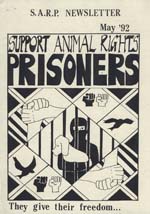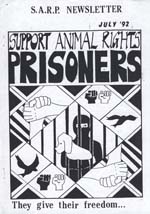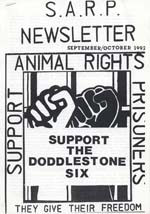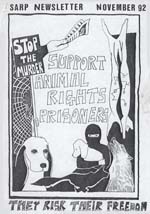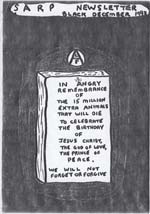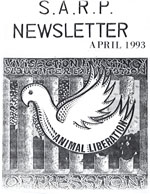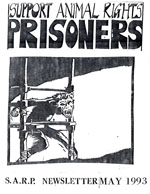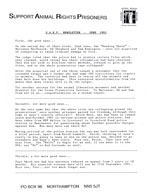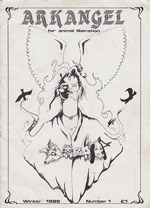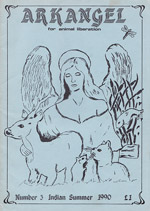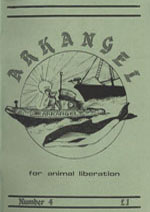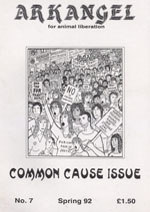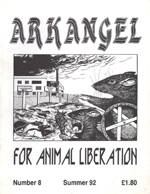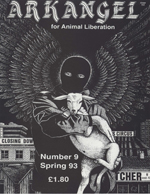Barry was one of the most dedicated activists our struggle has ever known, but it would be a disservice to him to strip him of his humanity by pretending that he was without error. There are some poorly examined ideas in the pages of SARP that deserve measured critique, but for every weakness there are also beautiful moments that give voice to our imprisoned comrades, remember our dead, and call for nothing less than a revolution to liberate non-humans. Barry wrote with an intensity and single minded dedication that reminds us of just how precious each second spent fighting is, and how we must stop wasting those ticks of the clock. To Barry, life, and even death, should be utilized battling the scourge of speciesism. These newsletters are Barry’s voice ringing out from decades past, telling us to ACT NOW in solidarity with the animal nations.
Djurens Befrielse Front
Arkangel
Arkangel 1-5, 7-11 (1989-1994. London, England)
Vivien Smith, whom I had previously worked with in publishing the ALF Supporters Group newsletter, had recently been released from prison and we teamed up again to produce the first issue of Arkangel, with me doing most of the writing and Viv typing it out and putting it together with artwork to create the magazine.
The second issue was produced in a similar fashion but, after that, everything had to change, as the prison stopped me from sending out articles, following complaints from the vivisection industry, and Viv was put in prison again for ALF actions.
The omission of issue #6 is not an error- it was never printed. Arkangel’s offices were raided just before publication of the issue. We are still seeking additional issues of Arkangel. If you have them- or other publications of note- please contact us!
Facklan
Facklan (1996-1997 Umea, Sweden)
(Editors note: Facklan is a Swedish language publication that we bring to you due to its historical significance. Umea, Sweden produced one of the most remarkable animal liberation communities of the 1990s. Their influence was so strong that politicians in Sweden stated in national media that they feared animal rightists may collapse the countries infrastructure, both through sabotage and the conversion of the nations youth to veganism. Facklan was produced during the infancy of this tiny, but formidable uprising. One of our readers from Sweden has offered the summary that follows.)
Facklan (The Torch) was a Swedish magazine supporting the A.L.F. and
other radical groups fighting for the animals. It was released in four
issues in 1996-1997, during the biggest peak of A.L.F. activity in the
1990:ies in Sweden. The magazine was based in the northern city Umea,
which was well known for it’s number of vegans and animal rights
activists, militant (all fur shops closed in Umea as a result of the
A.L.F.) as well as non militant (almost 50 percent of the students at
some schools were vegetarians). Umea was often referred to as the
“Vegan Mecca”, and was also well known for bands promoting the animal
rights message, such as Refused.
The first issue contained translated interviews etc from mainly UK and
US sources, and also had copied text from the Swedish militant
activist/anarchist manual Lila Svarta. Of course there was also a
diary of actions and addresses to imprisoned animal rights activists.
Two spreads were also dedicated to show mainstream media articles from
the time, also serving as a sign of the impact of the A.L.F. activity.
During the later issues, more of the content was produced by Swedish
authors. In the second issue, there were a lot of more news from
Sweden and Finland, letters to the editor, communiques from the newly
started group The Wild Minks, a report from the riot against the fur
auction in Skara, a piece on the repression of Umea acitivists,
reviews of records under the headline “Activist Core”, and now also a
diary of actions focusing on Sweden. Content from abroad was still
used though, this time information from The Final Nail and on Barry
Horne. On the last page, a summary in English was also published for
the foreign readers.
The third issue contained an exclusive interview with The Wild Minks,
the group that got most feared among the fur farmers, for liberating
minks and setting fire to properties of the fur industry. An address
list to all Swedish fur farms was published together with slogans such
as “What are you waiting for?”. There were critical articles directed
to hardcore posers, as well as articles about how animals that had
been liberated were doing in their new homes.
The fourth and the last issue contained more articles like “How the
Raid was Done” – often raids that the police had said were so
professional it had to have been carried out by professionals from
abroad… One person urges for a Swedish A.L.F. Supporters Group, and
a spokesperson who could defend the actions openly. Til now, this had
only been done my anonymous activists in balaclavas, or by Emelie
E:son, an anonymous A.L.F. activist from the 1980:ies. Focus was also
targeted on groups trying to attack Peter Singer (who was at a visit
in Sweden during this period), there was a big report from the animal
rights campaigning and activity against the vivisection at the Umea
University, as well as more information directly from The Wild Minks.
After the last issue, a Swedish A.L.F. Supporters Group was founded,
doing both work towards the media as towards prisoners and the animal
rights movement in general. They also released their own magazine,
later named Befriaren (The Liberator).
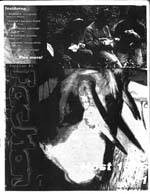

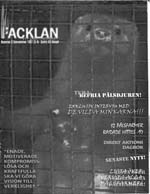

DISCLAIMER: animal liberationist is an online archive preserving the history of protest movements for animal rights and environmentalism. Its owners, contributors, and designers are not responsible for actions taken by third parties which may be harmful or unlawful to the individuals or entities named in archived publications. This web site is provided for the purpose of historical research and analysis, and is not intended to incite, encourage, or condone any criminal action on the part of its readers. All opinions expressed in our archives are those of their original authors only.

